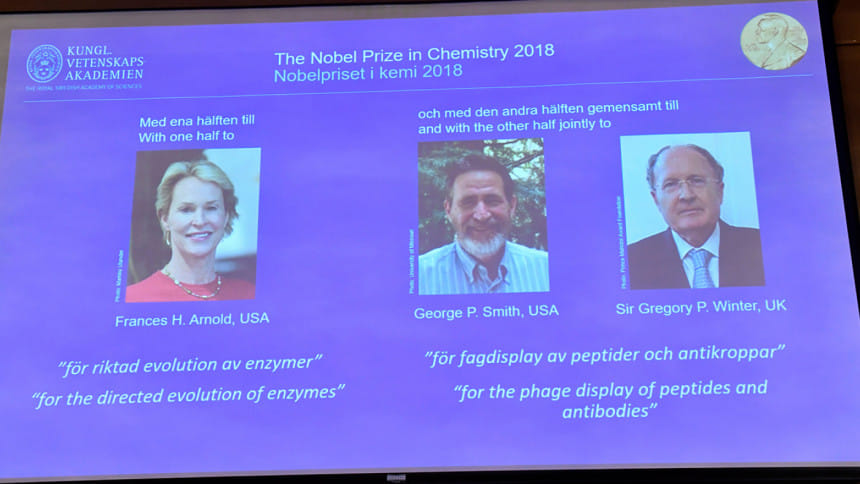Briton, 2 Americans win Nobel Chemistry Prize

--Work paved way for new chemicals, modern antibody drugs
--Fruits of research include blockbuster medicine Humira
--Arnold only fifth woman to win a chemistry Nobel
US scientists Frances Arnold and George Smith and British researcher Gregory Winter yesterday won the Nobel Chemistry Prize for applying the principles of evolution to develop enzymes used to make everything from biofuels to medicine.
Arnold, just the fifth woman to clinch chemistry's most prestigious honour since Marie Curie was honoured in 1911, won one half of the nine million Swedish kronor (about $1.01 million or 870,000 euros) award, while Smith and Winter shared the other half.
"The 2018 Nobel Laureates in Chemistry have taken control of evolution and used it for purposes that bring the greatest benefit to humankind," the Swedish Royal Academy of Sciences said.
Life on Earth exists because over the past 3.7 billion years organisms have adapted to their environment, with evolution solving complex chemical problems: fish can for example swim in polar oceans because they have antifreeze proteins in their blood.
The trio used the principles of evolution -- genetic change and selection -- to develop proteins now used in a range of fields, in what is known as directed evolution.
"They have applied the principles of Darwin in test tubes. They have used the molecular understanding we have of the evolutionary process and recreated the process in their labs," the head of the Academy's Nobel Chemistry committee, Claes Gustafsson, told reporters.
"They have been able to make evolution many 1000s of times faster and redirect it to create new proteins."
'ENGINEERING METHOD'
Arnold, 62, who has survived breast cancer and is a single mother to three sons, is a professor of chemical engineering at the California Institute of Technology.
Her method of rewriting DNA to mimic evolution has helped solve problems such as replacing toxic chemicals like fossil fuels.
As a result, renewable resources like sugar cane are being converted into biofuels. More environmentally friendly chemical substances are being developed, improving everyday products such as laundry and dishwashing detergents to enhance their performance in cold temperatures.
"The most beautiful, complex, and functional objects on the planet have been made by evolution. We can now use evolution to make things that no human knows how to design," Arnold said in 2016.

"Evolution is the most powerful engineering method in the world, and we should make use of it to find new biological solutions to problems," she said.
"Instead of pumping oil out of the ground for making gasoline, now we can use sunlight stored in plants."
'ENORMOUS IMPACT'
Meanwhile, Smith, of the University of Missouri, and Winter, a 67-year-old genetic engineer at the MRC Laboratory of Molecular Biology at Cambridge, developed an "elegant method" known as phage display, where a bacteriophage -- a virus that infects bacteria -- can be used to evolve new proteins, the jury said.
Pharmaceuticals for rheumatoid arthritis, psoriasis and inflammatory bowel diseases have resulted from their research, as well as antibodies that can neutralise toxins, counteract autoimmune diseases and in some cases cure metastatic cancer.
"The discoveries by George Smith and Greg Winter are having an enormous impact, particularly on medicine with antibody drugs that have fewer side effects and are more efficient," Goran Hansson, the head of the Royal Swedish Academy of Sciences, told reporters.
Alan Boyd, president of Britain's Faculty of Pharmaceutical Medicine, hailed the award.
"The use of antibodies has resulted in a paradigm shift in the way that we now treat so many diseases which has brought significant benefits to patients across the world and will continue to do so for years to come," he said.
Alfred Nobel, who created the prizes in his will, was himself a chemist, and devised his famed awards in part to atone for inventing dynamite.
Arnold, Smith and Winter will receive their prize from Sweden's King Carl XVI Gustaf at a formal ceremony in Stockholm on December 10, the anniversary of Nobel's 1896 death.
The 2018 Nobel season continues tomorrow with the announcement of the peace prize, and wraps up on Monday with the economics prize.
For the first time since 1949, the Swedish Academy has postponed the announcement of the 2018 Nobel Literature Prize until next year, amid a #MeToo scandal and bitter internal dispute that has prevented it from functioning properly.

 For all latest news, follow The Daily Star's Google News channel.
For all latest news, follow The Daily Star's Google News channel. 








Comments